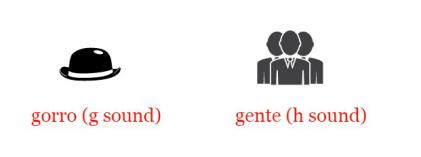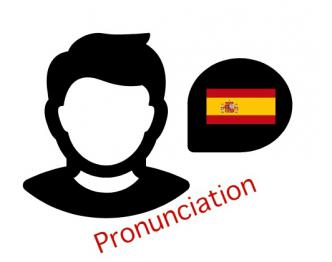Spanish pronunciation rules
Sign up for free to get all information about private lessons and our available group courses (A1, A2, B2, B2, C1, C2)
Sign up for freeSign up for free to get all information about private lessons and our available group courses (A1, A2, B2, B2, C1, C2)
Sign up for free¡Buenos días! Let´s get started with voicing Spanish!
Vocalization of Spanish letters might be confusing for an English speaker as they represent different sounds from their English equivalents. Let´s take a look on those letters that make a difference with regard to pronunciation.
Take online language lessons with a professional teacher
The letter g before the vowels a, o, u, ue, ui has the English hard g sound, such as in the word "good". However, before e and i, g sounds as exaggerated English h.
| g sound | exaggerated h sound |
|---|---|
| guerra (war) | gerente (manager) |
| gastos (expenses) | gigante (giant) |
| gorro (hat) | gente (people) |

The pronunciation of Spanish letter y is the same as of Spanish i. For instance:
Depending on the Spanish-speaking country or region this letter could be heard as [ʝ], [ʒ] or [ʃ]. Notwithstanding, the majority of Spanish speakers say it like the letter y. In other words, ll and y represent the same sound. It could be compared to the sounding of the English "yes". For instance:
The Spanish x sounds just like the English one. Exception to the rule are the names containing x. In this cases the letter would rather sound as English h.
| x sound | h sound |
|---|---|
| xenófobo (xenophobic) | México |
| xilografía (woodcut) | Xavier |
In Spain it is pronounced like English th in the vocable "thanks" for example. In Latin America the same letter sounds like s. Some Z-words:
In Spanish v and b represent the same sound:
J is alike English h in "hi", but exaggerated. It is also the same as Spanish ge and gi:
It's like English oo in "roof", but shorter in the majority of the words. In the variants gui, gue and qu it is silent, unless it is marked this way:
| oo sound, but shorter | silent u | güe, güi |
|---|---|---|
| Usted (you, polite) | guerra (war) | pingüino (penguin) |
| uno (one) | guitarra (guitar) | cigüeña (stork) |
If it´s followed by the vowel sounds e and i, the pronunciation of the letter is like th in English (in Spain) or like s (in Latin America). If the letter is followed by the vowels a, o and u it is pronounced as k.
| th sound or s sound | k sound |
|---|---|
| cerveza (beer) | cuando (when) |
| cielo (sky) | comida (food) |
Do you remember the pronunciation lesson number 1 from the alphabet lecture? Let us remind you the most important points:
Which are the common rules?
The Spanish acute accent called tilde (á,é,ó,í,ú) is very important in the language. It indicates that the normal rules of the word stress are being violated. Words with accent mark have to be learnt by memory. For example:
Some more words with "tilde" are:
| Some words with acute accent in Spanish |
|---|
| énfasis (emphasis) |
| politización (politization) |
| canción (song) |
| francés (French) |
| característica (characteristic) |
| según (according) |
![]() Acute accents are also used to distinguish words written in the same way, but with divergent meanings. For instance: si (if) and sí (yes).
Acute accents are also used to distinguish words written in the same way, but with divergent meanings. For instance: si (if) and sí (yes).

Now you can watch the video below or practice with the audio, microphone and exercises. Have fun!